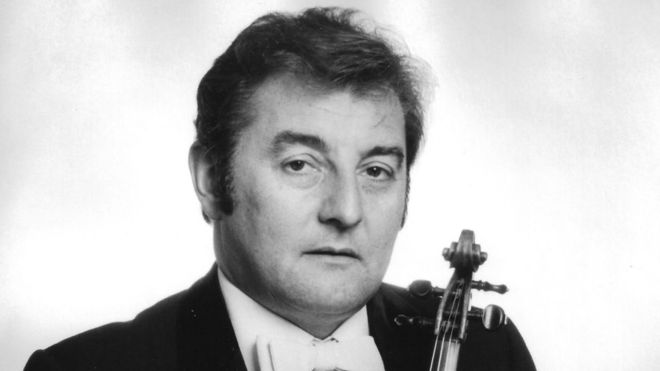
The widow of a British violinist is to receive UK royalty payments for his part on Michael Jackson’s Billie Jean for the first time in three decades.
Reginald Hill played on the string section for the track’s recording sessions in Los Angeles in 1982. His widow Elizabeth criticised royalty payments body PPL, saying the claims process left her feeling “less than human”. PPL said it received “conflicting evidence” about Mr Hill’s contribution. It added it resolved the issue within a year. Professor Ian Hargreaves, who carried out a government review of intellectual property, said it was the kind of case that demonstrated the UK’s creative economy must be managed “fairly”.
“It’s vital that markets work well, are regulated fairly and clearly and that appeal can be made against wrong decisions,” he said.
PPL said it paid more than 5,000 record companies and 63,000 performers last year.

Billie Jean was one of the world’s biggest selling singles and topped the UK and US singles charts simultaneously in 1983.
Mr Hill died in 1992, four years before laws were introduced in Britain requiring record companies to share broadcast royalties with featured artists and session musicians.
He was principal second violinist for the London Symphony Orchestra before moving to Los Angeles, where he recorded with artists including Barbara Streisand, Frank Sinatra and Madonna.
UK law means payments should continue to the families of artists after their death. Mrs Hill said her husband rarely spoke of his commercial recording work and she was unaware many of his contributions had not been credited with UK royalties bodies. “It first came to my attention when Michael Jackson died. I realised they are going to be playing this stuff a lot – I know Reg did a lot,” she said. She contacted PPL in 2011 to make them aware of Mr Hill’s contributions to dozens of works, but said the claims were later “rejected out of hand”. PPL said there was no specific claim in its system for Mr Hill to be added to the Billie Jean performer line-up before December 2014.
In 2015, Mrs Hill supplied PPL with the original recording contract between Michael Jackson’s record company and her late husband’s union showing the violinist was paid $158 (£110) for the Billie Jean recording session. But PPL told a US musician’s union its “working assumption” was that Mr Hill was “in the studio” but did not make it on to the final mix of the recording. Mrs Hill described feeling “depersonalised” by the handling of her late husband’s work. “It’s a system that’s just too hard to fight,” she said. “You shouldn’t have to fight – they should be working for us not against us and it feels like we’re fighting them every inch of the way.
“I know that if I had not had the help [from musicians in the US], I would have got nowhere.”
In December last year PPL said it was adding Mr Hill to the performer line-up for Billie Jean as his work “likely did appear on the final mix of Billie Jean”. It said it also added him to 54 further recordings with artists including Earth, Wind and Fire and Julio Iglesias. PPL’s chief executive Peter Leithem said the not-for-profit organisation has “no interest” in performers not being paid.
He said: “It wasn’t a situation where we weren’t trying to pay money to Mr Hill, it was just for this particular recording there was a disputed range of facts. “By the time we concluded those investigations by going and speaking to different sources and doing more work, we then got to the position where he should be added to that recording.”
For some in the music industry the case signifies a wider problem dating back many years with performers left unrecognised for work and mistakes in assigning the correct ownership of material. The organisation denies sanctions are insufficient against record companies who have not supplied accurate performer details to its repertoire database. Mr Leithem said this year, for the first time, record companies that do not supply such details will automatically fail to qualify for royalty payments for the track involved. But critics believe the measure does not go far enough as the mandatory part of the requirement involves just two performers being added to line-ups and involves only new recordings.
PPL said its database contains millions of titles and it prioritises the accuracy of those likely to receive payments.
In 2014 the company collected more than £190m from 300,000 UK broadcasters and businesses including the BBC, ITV, pubs, nightclubs, supermarkets, hairdressers and charity shops who buy licenses to play recorded music in public.
SOURCE: BBC



